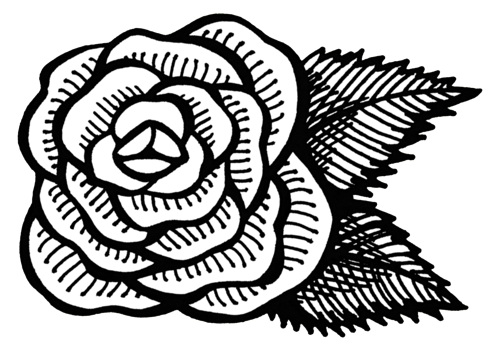We cover way more material in an hour long chat than we can fit into a neat blog post, so if you have the time, I highly recommend listening to the full conversation here.
Read on for a transcript of the highlights, notes, and links to all references and shoutouts. This transcript has been edited for clarity and length. The audio conversation has been edited for clarity and background noise as well.
Note: Since we spoke, Jamie updated the Pop Tarot format. On Monday, they interpret a card using song lyrics. On Friday, the interpret the same card using non-music media. Sometimes on Wednesdays, there are guest posts. It's more sustainable for them and also, ideally, more fun.
For me there’s no reason that witchcraft and intangible, popular things should not overlap. As someone who mediates a lot of my self-understanding through media, and also through tarot, I can do all this at once in fact!
Hi Jamie, welcome! First off, tell us a little about yourself and your journey with tarot. What drew you to it, and how would you describe your approach to tarot?
I want to say a little over three years ago maybe, my best friend is a witch, and they had started doing tarot and I was kind of wary of it. I was not intrigued, but I let them do a reading for me because I’m interested in stuff they’re interested in, and I thought I was just kind of playing along. And they finished the reading and I was like, “well that’s real! That’s a real thing.”
I was about to leave to do an interview trip for a while right before this, and I was going through one of their decks, Raven’s Prophecy by Maggie Stiefvater, and they had me pick out two cards I liked the pictures on so they could tell me about them. And I picked, totally by accident, The Fool and The World.
That’s quite a pair to start with!
Right? And they gave me a metaphor for it which I still use, which is the Fool sees a waterslide and runs up it and is like, “cool!” and goes down and doesn’t think about, is there water? Are you wearing a bathing suit? The whole thing. And then the World goes up and they can see everything that is wonderful and dangerous about the slide, and chooses to go down anyway. Which feels kind of like my tarot journey a bit.
I got back from this trip. They bought me a deck. I bought myself a deck, and I just sat and learned and practiced, and you know, the things people do.
That’s quite a start! The Fool and The World.
Why did you decide to explore tarot through pop culture? How did those two come together, and what do they tell you about each other?
So just on a really basic level, I like them both a lot. They’re the things I’m most excited about. But also, there’s the high-culture/low-culture divide that people talk about. I think a lot about shame and desire, like many queer people, and the ways that when we talk about something that’s low-culture, many people are usually pretty quick to be like, “oh but I know it sucks. I know it’s trashy.” And I find a similar thing sometimes with tarot and magic.
Something I [say] when I read for people I don’t know—something I do genuinely believe—[is that] tarot works equally as well if you believe it’s magic in some way, or if you think it’s a random set of meanings and Images. You’re still getting something from it. But it took me a minute to take myself seriously about it, and that was also true of pop culture for a while. So combining these things that I love, that I do take seriously, but that you’re not supposed to.
And also the cultural image of witchy stuff is that it’s sitting out in the dirt and hugging a tree. (I say as someone who does love to do all of those things!) But for me there’s no reason that witchcraft and intangible, popular things should not overlap. As someone who mediates a lot of my self-understanding through media, and also through tarot, I can do all this at once in fact!
That’s great!
I have a set of values. They’re often not the same set of values as ones you receive through scripts. . . . But I do feel a thing about that social script. It’s a good feeling, and while I don’t want to behave in that way, are there ways that I can bring the feeling of that into my life without doing the script?
So I love this question. For me the main thing is just paying attention. We all pick out scripts throughout our lives and whatnot, and those kind of large-scale cultural, structural scripts play out in individual pieces of art. First for me it’s recognizing what the scripts are, and there’s some ways you can read about that, and some ways you have to figure it out.
I was thinking a lot about the Eight of Wands. The way that I read the Eight of Wands is like simultaneously receiving information and acting on it without taking a pause to think about it. And I think sometimes that’s good and necessary to receive and act. Also sometimes, maybe take a second…
For me a lot of dealing with the scripts is also recognizing how you feel about them because—I will I-statement this, but I think I’m not the only one who feels this—I have a set of values. They’re often not the same set of values as ones you receive through scripts. Like in The Good Wife, and the will-they-won’t-they. Will they kiss? Won’t they? I’m like, oh I love this! Please never talk about your feelings and kiss dramatically! Which is not what I want from my life, personally. I’m very direct. But I do feel a thing about that social script. It’s a good feeling, and while I don’t want to behave in that way, are there ways that I can bring the feeling of that into my life without doing the script?
With tarot specifically, for me the issue there is combining scripting and also desire, because cards can mean so many things in so many circumstances. Sometimes I’ll pull one and I’ll be like, “well, this does seem to have a clear meaning…” and sometimes be like “but I don’t want it to! In fact, I will do something else.” And if I don’t want it to, sometimes it’s because as the day goes on, I realize I was not correct in what I thought that was meaning for me. But it’s often paying attention to what does this script with this card feel like, because it is a script that is not structurally or culturally ascribed in the ways that I find as aggressive and violent as a lot of pop culture stuff. It’s more figuring, does this script feel good? And if doesn’t, am I making another script because we’re making it up, or am I actively splitting from a script?
So the newsletter format—you present most of your tarot writings to date through a weekly newsletter. Your letters have an interesting tonal blend of research, analysis, confession, and camaraderie. There’s a kind of intimacy there that springs in part from delivery right to the inbox. From the reader’s point of view, depth letters from artists and strangers definitely out against the backdrop of ads and work requests. Why did you choose a newsletter for your format as an author?
Honestly, the primary reason is because from capitalism. I’m disabled. I can’t do a lot of jobs. People might pay me for that.
The other thing is that I used to be big on letter writing, so it’s a format that I know, I’m used to. I have so friends who do really beautiful newsletters. Shoutout to my friend Alejandra Oliva. Reading her newsletter and seeing the way she engaged with it, and writing a guest post for it. I was like, oh this feels like a format that’s good! Plus, [it’s] practice writing all the time. But really, honestly, it’s capitalism.
Sometimes it’s like pinball bumpers. Those restrictions push you in a direction that ends up actually working really well for you.
Yeah, I’m psyched on it! I’m real glad.
It’s really fun! It’s different. I like it a lot.
Your subject matter and voice are super current and then, like you mentioned, it has a quality that reminds me of the lost art of physical writing. You have a footnote habit that’s kind of a throwback. I think of shades of both 90s mail art and zine culture in what you’re doing. Is there intentional anachronism there, and what are your thoughts on resurrecting past culture while pushing forward a recent and under-explored form like email journalism?
Hmm. It’s funny, on a very granular level, the footnotes thing—so I’m a huge copycat—not in terms of content, obviously, in terms of form. I read something and then I’m like, oh well I’m doing that now! There was a year or two where my best friend and I both tried to write like this same author that neither of us sound like. But not many months before I started this, I read Confessions of The Fox by Jordy Rosenberg, and a lot of it is told through footnote, and it’s specifically told through modern footnote with an older text. The older text is written in the now, but it’s ostensibly not in the book. I got really excited about the ways that functioned in terms of combining the new and the old, but that both were happening right now.
I was at a friend’s place recently—I guess it must have been in December because multiple people, they’d received those classic Christmas letters like, “oh we got a dog and got new jobs” and whatnot. I was going through those and being like, huh, while this is not my thing it is really cool to, at a specific time, receive a thing. You won't know the actual content, but you’ll know the concept. It’s very comforting, regular. For me, it’s a way of keeping a schedule also.
The accessibility, the ways that many many of us have access to email, is such an interesting way of connecting, cause it is all of the things you said, and does not have a lot of the personal elements of like someone's handwriting, so trying to bring that in.
Having these ways of being together in community feels to me both very ritual and spiritual, particularly around low culture stuff that we are supposed to think is not either of those things.
In a recent letter, you wrote of making pop-culture pilgrimages to key film sites. It reminded me a little of Patti Smith writing about her pilgrimages to literary sites. I like the idea of finding symbolic and ritual meaning within arts and media. How do you connect to media as a ritual or spiritual container?
So some of it for me is—this feels both ritual and spiritual, although I feel like if I was telling the story without those words someone might not apply them—but, because of the way I experience and understand emotions, they are often refracted through media. So subsequently I will talk about TV a lot in therapy, as one does. And I was watching Fleabag at some point, which was very textually about ritual and spirituality and Catholicism, which is a whole other thing. There was something in it that really was very difficult for me in a way I did not expect.
So the title character doesn’t actually have a name. Everyone refers to her outside of the show as Fleabag cause that’s all we have. This season, there was a character who apparently in script was just “Priest.” We now collectively, via critics and also the internet, just call him “Hot Priest.” He is a good looking man. So there was this moment with Fleabag and the Hot Priest that I had a whole thing with and I went on a long walk about it, and I had a personal moment of spirituality with the sky as usually is the case in such a moment. And there was this cultural thing to me that felt very ritual about everyone talking about this Hot Priest. It was happening on Twitter, it was happening in reviews, it was happening in IRL conversations that I was having. And it was repeating this thing that is not in a script, that we have all just collectively decided on.
The MASH finale, unless this has changed recently, but I don’t think it has, was the largest single simultaneous water usage in New York or the country, I don’t remember. [It was New York.] Basically because everyone was watching it, and then, when it finished, everyone went to the bathroom. It was this collective thing where it’s like a record of a thing that happened. While that’s not the same anymore because we have so many options, and we’re usually not watching live, it’s [still] this way to have community.
In the last winter Olympics, there was Virtue and Moir, the ice skaters that everyone, myself included, wanted to kiss. They did not. Devastating! But it was again this ritual. People were talking about it in person, people were talking about it online. There was a lot going on! It was like, we are all doing this together. And while it’s ice skaters that we want to kiss one another, it felt to me this kind of spiritual thing. What we are collectively thinking about through Virtue and Moir is love, and romance, and bodies, and very hard work, and the concept of winning. They won the gold! Having these ways of being together in community feels to me both very ritual and spiritual, particularly around low culture stuff that we are supposed to think is not either of those things.
Do you have any recommendations for people who want to generate a ritual practice around their media or art that they’re into? How would you build a meaningful ritual around something you’re really into watching right now if you’ve never done it before?
I love this. Okay. There’s a show called Black Sails. I love it so much except the first season, which is produced by Michael Bay. But the rest of it is very explicitly queer, and about revolution, and I was watching it with someone I did not know very well, and now we have the same tattoo from the show. During it, both of us were trying to find ways to engage with the text outside of the actual watching of it. So I went through all of the characters, and I assigned court cards to them, and I wrote a little bit about why. And my friend did not read tarot, so it was kind of this sharing of “how can I understand this through this other thing that I find very spiritual?”
I made a deck of scenes from TV as the cards, and while one does not need to make the physical deck, just having a list of literally every card being like, oh this scene made me feel this way, which is a different way into this card. And play with music that relates to a card or relates to a show and a card, doing that.
Also physical things. Many years ago, [on] Friday Night Lights, the big thing is “clear eyes, full hearts, can’t lose.” I love it. I also feel complexly about it. But I got a needlepoint from Etsy many years ago that said it, and I would take it around wherever I was living. At some point, I no longer felt that I needed it, and I gave it to someone else. But literally getting a physical thing, or making a physical thing that’s related. I’m also very, not interpersonally touchy, but tactile. So whatever kind of learning style you have, the way you take in information—finding a way to use that thing that already works for you.
One of the super cool things about oral history is that with that many people talking about the same thing, it becomes very clear that there’s not really a concept of historical fact because these are the people who were there and would know, and they all remember it differently. Something I love about oral history is you get different understandings of the same actual moment in addition to different thematic understandings.
Yeah! What is oral history? Very classically, oral history is the recording of life histories, sometimes just about someone’s general life, sometimes with a topic or a theme. Sometimes they’re very academic, and—this makes me so angry—a lot of times it’s not even pay-walled, it’s academia-walled, where you have to apply to see them, which I think is bad, personally. Other times, they’re like, the entire—it’s close to 200 oral histories about ACTUP are just for free online, and you can just read like 180 of them.
One of the super cool things about oral history is that with that many people talking about the same thing, it becomes very clear that there’s not really a concept of historical fact because these are the people who were there and would know, and they all remember it differently. Something I love about oral history is you get different understandings of the same actual moment in addition to different thematic understandings.
The way that I tend to do oral history is not quite oral history. I come out of documentary theatre. So when I first started doing interviews, it was ultimately about performing people's words. And at this point I will often do inter-genre work with it. So I will, very much with people's permission and consent, verbal and written, take what they’ve said and make things like blackout poetry. Stuff like that and stuff in conversation with each other, which is not technically oral history. But it is interview-based work, based off of someone's life. Very adjacent.
So yeah, on a very basic level, oral history: recording people's stories, and paying a LOT of attention, like tarot, to that this is not happening neutrally. Someone is not in a vacuum answering questions. How they’re interacting with you, how you sit, what you wear, where you are all makes a huge difference in these stories.
That’s really interesting connecting to tarot because the message changes depending on context constantly. We know this isn’t a static thing, and we know that it’s coming through a filter of interpretation. Most people don’t think about history that way! They just think it’s a fact. That's fascinating.
Do you take that then into your tarot practice? How does your view on narrative from all those different perspectives color the way that you would interpret say a single card?
Oftentimes—always, ideally—I will listen to how someone is phrasing their question. Like obviously the content of it, but the way that someone is talking about what they want to think about. I used to read at this bar every week and people mostly in that setting wanted to know about romance. Someone sat down and was like, “I want to know if I should break up with this boy.” And I was like, “well I can’t tell you that! But we can use cards to think about it.” We talked for a bit. And they were like, “so what you're saying is I should break up with this boy.” Cool. I had not said anything! But it’s clear that this is what [they] need from this interaction. And while I made no discussion about the actual thing, hearing that that is what they were talking about and going back to the cards and being like, “cool—here’s some more valences that exist in this card. This seems perhaps relevant.”
So really, I guess it’s trying to listen for people’s narratives of themself while they are asking a question. Because of the way I take in information, if someone is reading for me, they have to be down with me consistently stopping and asking questions. [So] leaving space for people to understand their own narratives and participate in their tarot narratives should they so choose.
So you end up reading the questioner as well as the cards. That makes a lot of sense given that line of work!
I always really like meeting unapologetic Renaissance folx. A lot of millennials in particular were pushed to be well-rounded when we were kids, to get into college, and then hyper-specialize the minute we came of age. It’s always a breath of fresh air when people find ways to balance multiple passions as adults. What strategies do you use to keep that balance for yourself without burning out or sacrificing the integrity of any one project?
I’m not great at it! I would not say it’s my strongest suit. I used to have a thing and go really really hard at it. And often, I would be really pleased and glad with the final thing, in particular if it was a community work thing where it was like yeah, no, this was great and worth it. I’m very Ten of Wands about it, but the result was great! And then, very dramatically, as a Gemini, I’m bipolar and I had my bipolar onset, and all of a sudden it was like, oh I can’t do that. That’s not physically possible or safe.
So there was a re-figuring out like okay, I actually can’t do that burnout thing anymore. This is not optional. How can I figure out how to still do things that I care about with less time and energy? It really was great in the sense that there are a huge amount of benefits to it. I cannot do everything infinitely. I have give or take this amount of energy. What feels most important? Is there anything with a deadline? What feels like something that I could emotionally engage with? And really choosing to pay a lot of active attention to my body and what I can and can't do, and keeping stock from there of like, this feels important, this feels doable, this requires other people, this doesn’t.
So may I recommend bipolar disorder?
Great! Solid. I’ve felt something similar with my own disabilities. It’s not something most people expect, in terms of workflow, to have it dictated from your body or from your limitations, but it can end up being really fruitful. I think people don't realize that outside the disability community, right?
Yeah. It’s really great in so many [ways]. Also, obviously, it’s a lot.
Yeah! I mean it sucks in a lot of—I wouldn't wish a disability on anybody—but . . .
You get so much out of it . . . (I do.)
Yeah. When you have something like a chronic illness or something like that that imposes restrictions, I think you can find a lot of worth within it. And . . . oh gosh, there’s such a dangerous line, when people put that on you like inspiration porn, right? That’s not okay.
It really isn’t. But sometimes it’s really cool the things you can do that you wouldn't otherwise be able to.
Right!
It’s a really hard line to talk about.
It really is. The things you wouldn't think to try, [but do] because you're being forced to innovate. I think it’s one of those things where people who experience that have every right to claim that for themselves and to find meaning and the benefit within that, but you’re gotta be really careful about how you talk about it for other people.
Yup! Like all marginalization.
[Side note: just to clarify, we’re not suggesting all people with disabilities should or need to feel good about them, or find meaning and value in them every day! And we’re not suggesting that people are lucky or fortunate to have disabilities! Those are common misconceptions that get put on disabled folx pretty regularly. We ARE celebrating the capacity for disabled people to find our own silver linings and thrive within adaptations.]
A lot of trans and queer people in certain styles of thinking communities are very predisposed to drop systems. . . . I think if you have a predisposition to be like, “ok this means this, but I’m cranky at the concept that things might mean things, so let's see what else I can do here,” [that] really adds.
Yeah! So, a lot of the cards are gendered. Trans people, you know, I would say collectively, we have thought about gender more than cis people. I think that is a fair generalization to make. And not just in the sense that the Empress and the Emperor don't have to be a girl and a boy, but in the sense that like I was taught the Moon as having some sort of feminineness going on. On one hand there’s the thing where you just take that out. And then I read a fan-fiction that really changed my perspective on it! It was from the Raven Cycle fandom, which those books actually have a lot of tarot in them. So this fic—I wish I could credit the person, I have no idea who wrote it—was a trans reading of one of the characters, and the character that I personally trans-read, and talked a lot about the Moon reversed in ways that were more complicated than just like “ah feminine switched as masculine!”
Because that was so early in my tarot [practice], it was the first understanding of oh, this can be so much in terms of how we think about anything gender or body related. A lot of trans and queer people in certain styles of thinking communities are very predisposed to drop systems. And I feel like you can experience tarot as “this means this, this means this, this means this, we’re done.” I think if you have a predisposition to be like, “ok this means this, but I’m cranky at the concept that things might mean things, so let's see what else I can do here,” [that] really adds.
Also just applying cards knowing that bodies are real and exist and matter a LOT. The way that I read that is very trans-related specifically is that bodies are important, body and self are not different, all cards exist somewhere within the body, which is definitely not how all trans people experience it, but has been my way of trans-reading and being like no, that’s all somewhere in there!
I want to have fun! You know? . . . While I too feel real bad about a lot of media stuff, there’s some amount for me of being able to simultaneously hold critiques, and also just be into something.
Beautiful! So—The LGBTQIA+--
The team.
The team—community—gets read widely as subcultural, and the occult is marginal by definition. Meanwhile, pop culture is largely an expression and product of the over-culture. There’s a fun contradiction in the absolute love affair that so many young queers and occultists have with pop culture. It can be kind of a fraught place for us, and I appreciate that you dig deep into that. You talk a lot about harmful tropes, misrepresentation, capitalism, queer-baiting, all that good stuff. Why do you figure so many of us on the margins love pop culture so much regardless of all that malarkey?
I would say many of us are working towards a better world and end up in communities that are sometimes insular and we’re really together in it, and often against these structural things. And also, we live in the world. If and when we go outside, we see billboards for, I don’t know, The Big Bang Theory. We don’t anymore, but we did for so many years. Often for me, turning inward to ask collectively makes sense.
And also, I want to have fun! You know? And I’ve found, both personally but also knowing people who are not willing to do that, my experience of them is they seem to have less fun in their day to day lives. While I too feel real bad about a lot of media stuff, there’s some amount for me of being able to simultaneously hold critiques, and also just be into something. Because yup, a lot of them are really harmful to us. Really actively harmful. I can point to things that like I really loved as a kid that were media but kind of fucked me up, but also I love it.
And then there’s the collective. We’re all in this culture and we can never participate in pop culture, or we can have a sort of wider sense of community even with people who we do not feel in more intense community with. Like, I love The Good Wife! That’s what people’s moms and grandmas love. When I’m with people who have parents that they don't necessarily like and I’m kind of there as a buffer, I can talk about The Good Wife with them, and I do, and we have a great time! It really allows for engaging in an external culture that we might not otherwise be able to, [that] regardless of whether we want to or not, we gotta do a lot.
Mmm, that’s very true! That’s very powerful.
Watch The Good Wife!
Ha! And it’s okay to just have fun!
I promise.
A lot of spiritual people need to hear that. Sorry not sorry, guys.
So what happens when we let pop culture get under our skin, and then we mess with it on our own terms?
Yeah! So I think that’s great. Love fan-fiction. Love it so much! Here’s a personal example. As a teenager, I was the exact correct age when Spring Awakening came out, which is a musical about teens and sex stuff. And there is a scene with the two queer characters. It was very much played for laughs in a way that a lot of the rest of it wasn’t, and as a not self-aware young teen I was very upset by it and I didn't know why. And then I wrote a ninety-eight page fan fiction about these characters, which is still on my computer and I open like once a year and close immediately.
The reason I bring this up is because that was not a great experience I had, but also I sure did spend ninety-eight pages working through my stuff about shame. The thing itself did not occur on my own terms and I could not make that scene different, period. But I could think and write about it, figure out new stuff about it, and I don’t think that’s a unique experience. Because we are told low-culture is not emotional, I think with tarot we can go the opposite way of “oh this is so meaningful!” Which it is, but also fun.
Fic. Just do fic in your head!
So this phrase is interesting to me and I’m not familiar with it. You mention coming from a place of “value neutrality.” I hadn’t heard value neutrality before. What is value neutrality, why have you set up camp there, and how does it enhance your ability to analyze pop culture?
So when I say that, I mean very specifically about a lot of words. I am not value neutral in terms of justice stuff. Like nope, that’s good, that’s not. There’s a lot of complexity in some, let’s talk, but mainly like…
Right. Like there are right and wrong answers to some questions.
Yes! And within right, there’s a lot to talk about. Maybe also within wrong, but I simply don’t know or care. But there’s a lot of words that I think we have applied positive or negative attributes to that [we] don’t actually have to. Like if we use the word cruel, that’s inherently negative. Personally, I cannot think of a positive way to perceive of the word cruel. But personally, my favorite example that’s meant a lot to me over the years is stubborn. We have this negative understanding of stubborn that’s often applied to children who don’t want to do something. And stubbornness is often a thing that actively keeps us safe, where it’s like, no, I know not to do this thing or I know to do this thing. People are telling me the opposite, and no. I am actually gonna do that, which is so powerful and positive! But we have kind of tanked this word—in ways that I think are very purposeful culturally, because we're not supposed to stand up for ourselves. Really thinking about words and being like, does this have an inherent meaning? And also there’s the interesting thing of—can I use a non-explicit but sex-related reference?
Yeah. [CW: explicit language about bodies ahead.]
Cool. So I’m in an adult B’nai Mitzvah class. I’m getting a B’nai Mitzvah this year, which I’m very excited about. And I’m at the point where I’m writing my d’var Torah, which is the little speech you give. And the thing I’m writing about is that there’s a lot of stuff that like bodies, that you’re not supposed to menstruate and whatnot, and how that’s messed up. Anyway, in the actual bit that I’m focussing on, it’s that you’re not supposed to ejaculate, you are unclean if you do, which is a whole thing to be supposed to not do! I was thinking about this, and it’s also in the same part where in Judaism, you’re not supposed to say G-d’s name. There’s no way to say G-d’s name. We just don’t have a word for it. We have a bunch of ways to talk about it.
So we have ejaculation, and we have semen, but the word ejaculate can also mean to speak sharply and directly and clearly. Those things can overlap but also, it doesn’t matter if you’re just using it the speech way, it has another connotation. This word actually can have this separate meaning. Also, culturally, it is haunted by this first meaning. What are ways that we can think about and use all of those things at once? That’s really interesting and important to me.
Sometimes if I’ve been doing something very difficult in therapy, my therapist and I will sit on the ground with cards . . . By the end of the session I might have a whole, not new in the sense that it erases the old one, but an additional reading of a card. . . Do tarot in therapy, if your therapist is down with it.
Do you have a favorite card or tarot archetype?
Yeah! For a very very long time it was the Nine of Pentacles. I’m still really attached to it, but I actually just did a thing with a different tarot project about it, and I feel certainly not like it’s behind me, but like I’ve kind of come to a place with it. And the Ace of Swords is really happening for me right now.
So I was thinking of it in terms of Dickinson and Death. But as I was writing it, I was like, oh no, this is about something else for me! I was like, cool, not gonna put this in here, but also I think anyone reading it who knows me well would be like, “uh, buddy…”
The imagery I have for Ace of Swords is like a sword, it’s a rock, everything lights up for a second and you can see your whole, difficult future, and that it exists and is hard and it’s the beginning. The difficulty does not mean it doesn’t exist. Literally exactly a month [ago], on top of the bipolar, I got a PTSD diagnosis, and I was like, this is maybe too much. This is maybe too many things. And so thinking about the Ace of Swords has been very comforting in the sense that like, well this is a lot! And the framework of more difficult instead of worse is something I sometimes have trouble with. And [with] the Ace of Swords I was like, oh this is more difficult, [and] there is also an entire nine cards left in the rest of the suit. So I’m hyper attached to it in this moment!
Yeah, that’s a lot! And this is one of those things about tarot, it hits you on multiple levels at a time, all the time. Every card can mean a million different things and it’s very common for multiple layers to activate at once
Sometimes if I’ve been doing something very difficult in therapy, my therapist and I will sit on the ground with cards, and I’ll pull a card, and if shit gets too weird they’ll be like “so we’ll maybe bring it back to that card. What’s that about with that card?” By the end of the session I might have a whole, not new in the sense that it erases the old one, but an additional reading of a card, which is super cool in the sense like archetypes—multiple things in one thing. Good stuff! Do tarot in therapy, if your therapist is down with it.
Do tarot in therapy is good advice!
It’s a real game changer on a personal level.
Any upcoming projects or events that the people should know about? What are you up to next?
Nope! Just the same general stuff. Working on this newsletter. Subscribe! Also doing a lot of individual readings. General oral history. Freelance oral history, freelance writing, freelance dramaturgy. Just a bunch of freelance stuff that anytime someone wants me to do I can sort of jump on and do.
Great! Jamie does a lot! Go hire them for all the stuff.
Yeah! Please hire me.
Where else can people follow you?
So there’s the Pop Tarot website, there’s my personal website. @poptarotcards on Twitter. I’m also on Instagram—I’m so bad at Instagram. I need to make it more real. But if you want to follow my personal, very unprofessional stuff on Twitter and Instagram, that’s @james0ctober but the first O in October is a zero.
Cool. Well thank you so much for your time! This was great!
Thank you!
Likewise! Lots of fun.
Yeah, truly
Many thanks again to Jamie for their time and insights! You folx know what to do next—follow, like, subscribe, and have fun digging into some of the media we mentioned here!
Jamie’s Links:
JamieBeckenstein.com
Pop Tarot
@poptarotcards on Twitter
Personal Twitter
Personal Instagram
Shoutouts & Recommendations:
Raven’s Prophecy Tarot and The Raven Cycle by Maggie Stiefvater
Alejandra Oliva's beautiful newsletter
Confessions of The Fox by Jordy Rosenberg
Re: arts & pop-culture pilgrimages, check out Patti Smith on Instagram @thisispattismith, and her titles Just Kids, M Train, and The Year of The Monkey.
The ACTUP Oral History Project
Little Red Tarot
Media Mentions:
The Good Wife
Fleabag
MASH
Virtue & Moir at the 2018 Olympics
Friday Night Lights
Spring Awakening
Are You The One?
House MD
Nightmare On Elm St. II (not recommended)
Dickinson
Game of Thrones (season 8 not recommended)
Steven Universe
The Craft

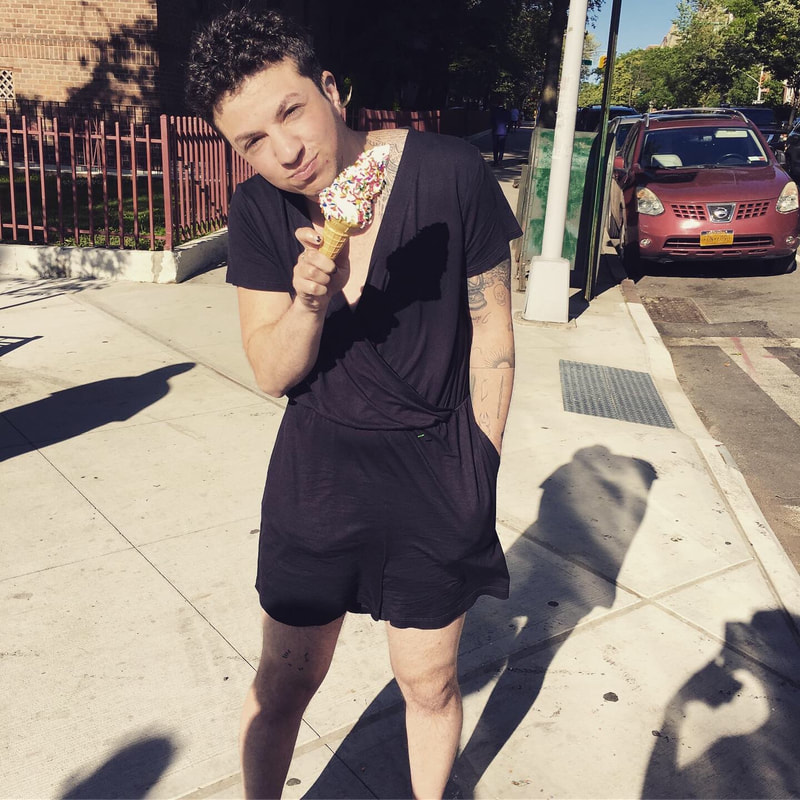
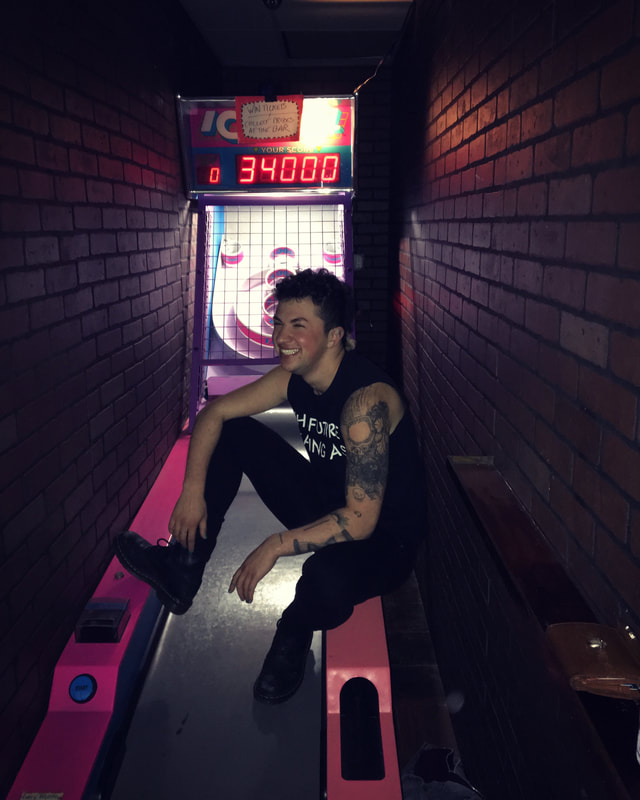
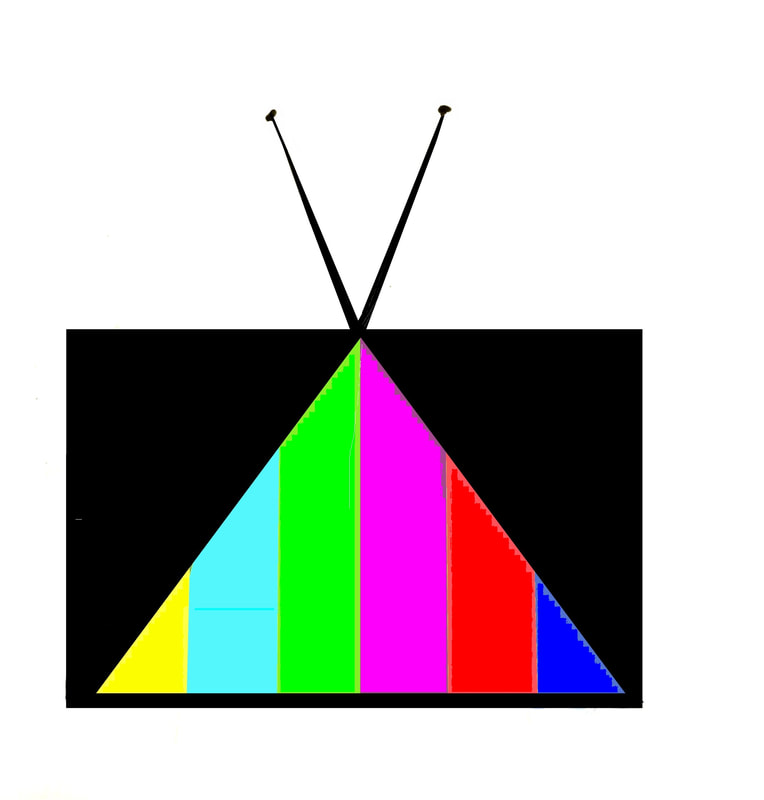
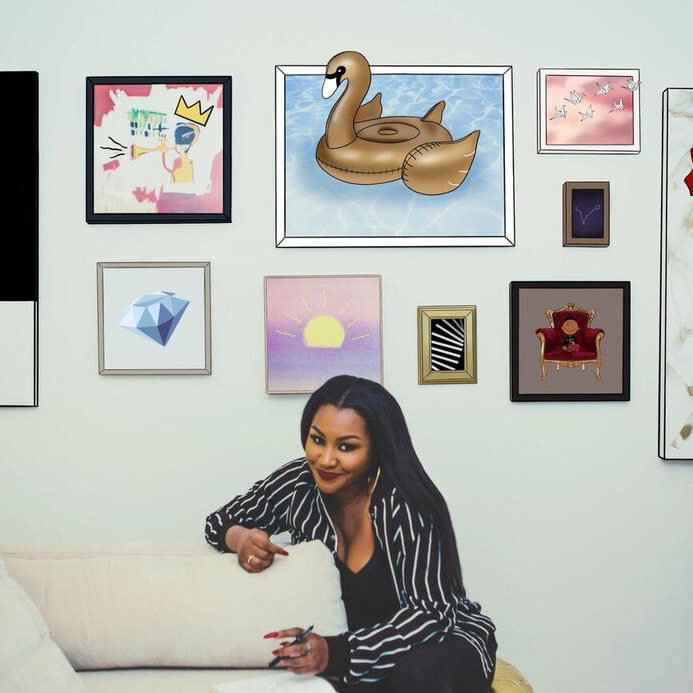
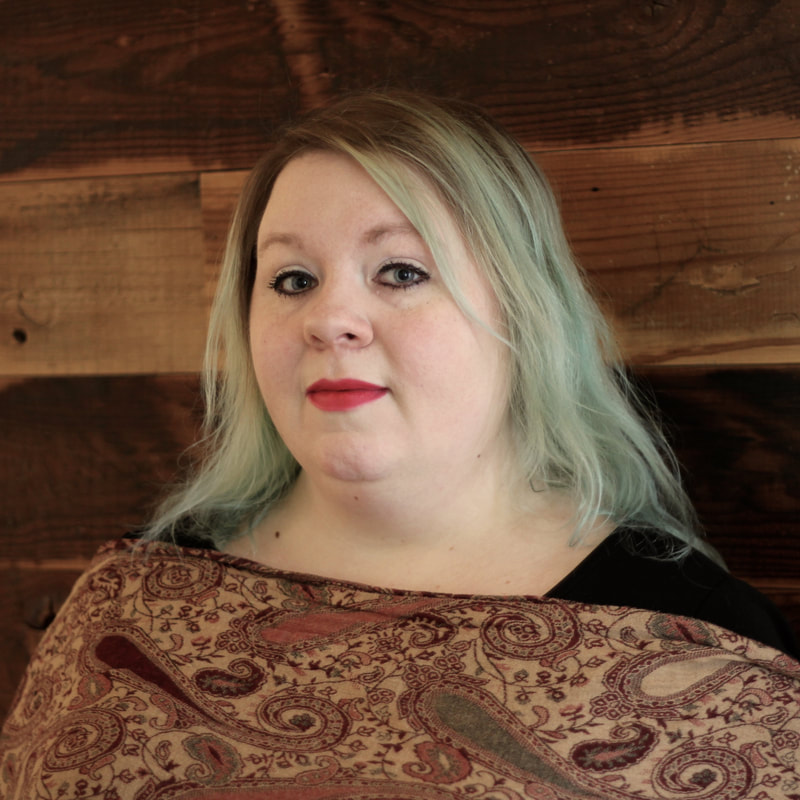
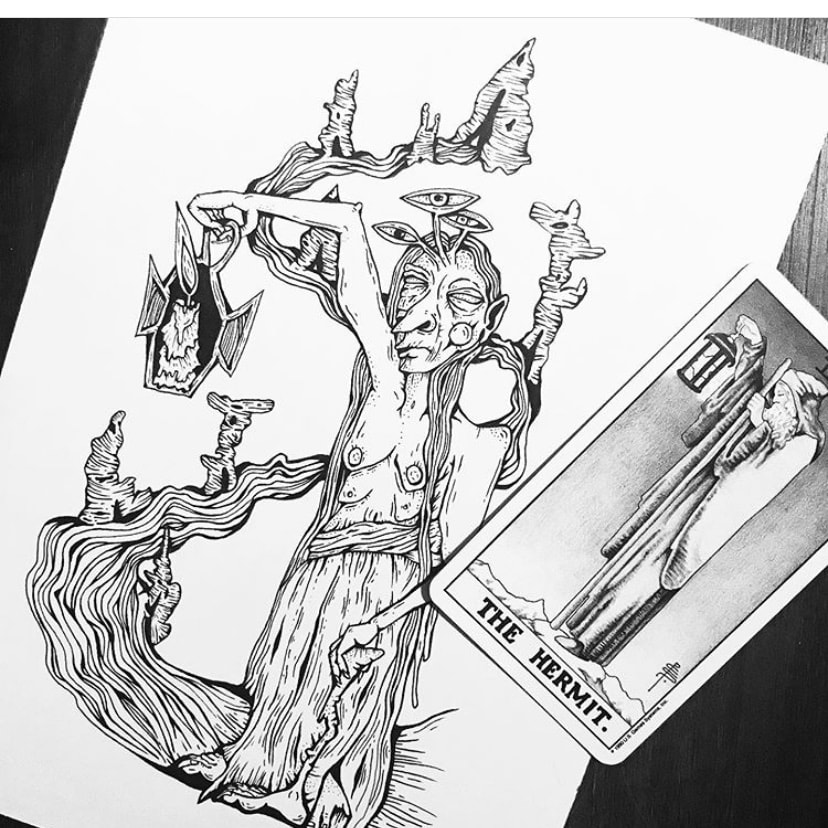
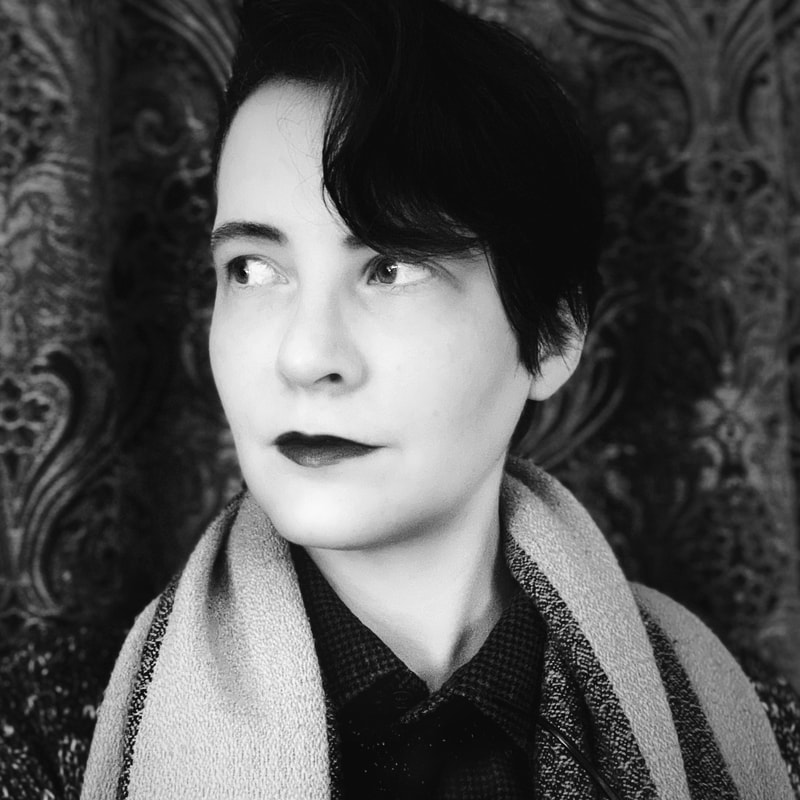
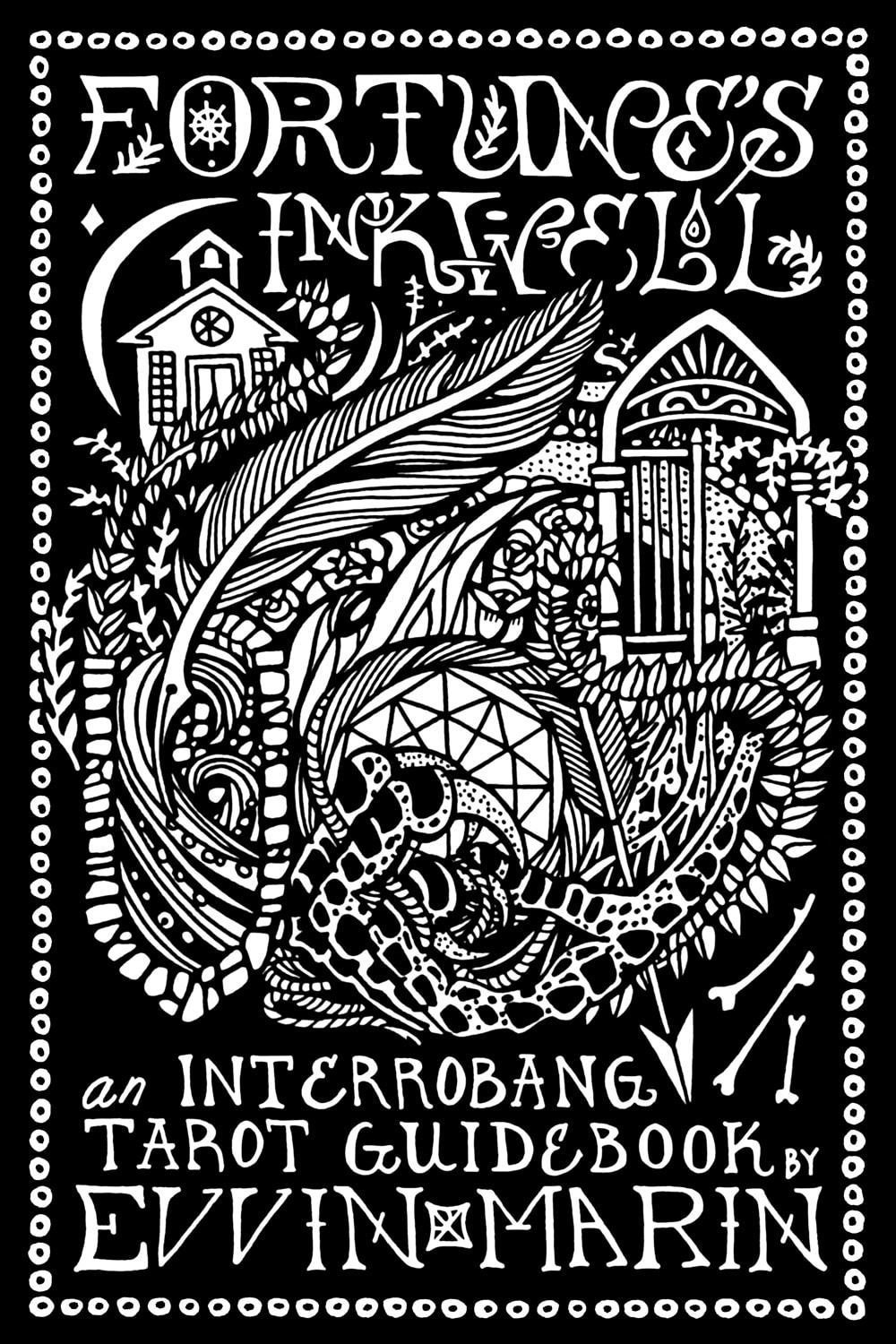
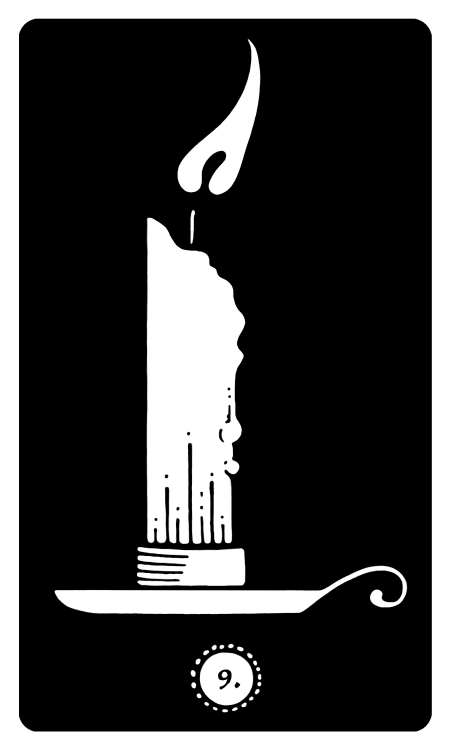
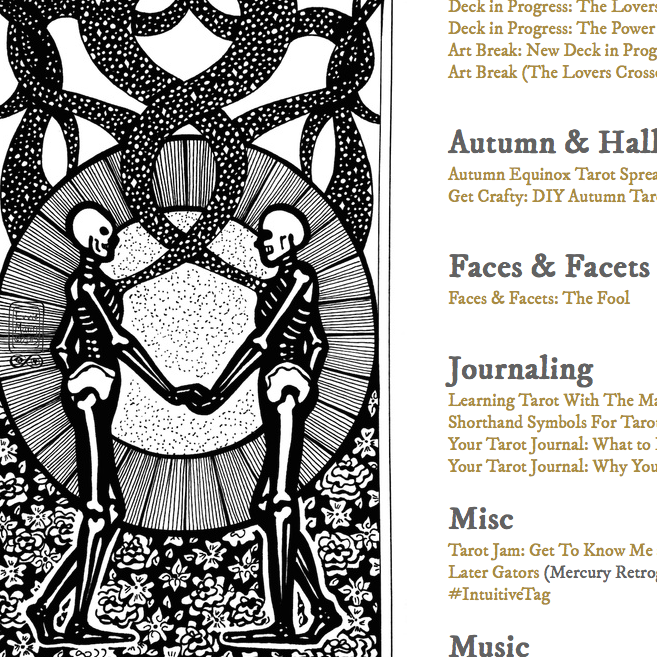
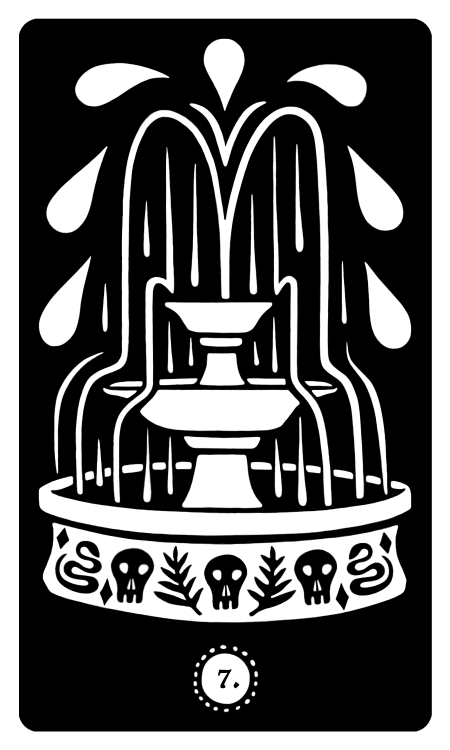
 RSS Feed
RSS Feed
